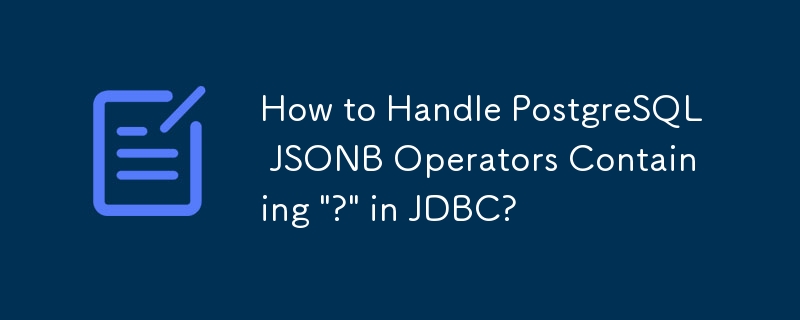Home >Database >Mysql Tutorial >How to Handle PostgreSQL JSONB Operators Containing '?' in JDBC?
How to Handle PostgreSQL JSONB Operators Containing '?' in JDBC?
- DDDOriginal
- 2025-01-01 02:20:10652browse

Using PostgreSQL JSON(B) Operators Containing Question Mark "?" in JDBC
JDBC integration with PostgreSQL poses a challenge when dealing with JSON operators featuring the question mark symbol, such as ? and ?|. The PostgreSQL JDBC driver interprets these characters as ordinary bind variables rather than operators.
Workarounds
Two solutions are available to address this issue:
Static Statements
This straightforward approach avoids the use of prepared statements. While it compromises performance and security, it solves the problem:
try (Statement s = c.createStatement();
ResultSet rs = s.executeQuery("select '{}'::jsonb ?| array['a', 'b']")) {
...
}
Functions
Operators in PostgreSQL are often aliases for functions in the pg_catalog. To find the underlying function for an operator, use the following query:
SELECT
oprname,
oprcode || '(' || format_type(oprleft, NULL::integer) || ', '
|| format_type(oprright, NULL::integer) || ')' AS function
FROM pg_operator
WHERE oprname = '?|';
This query will return a result similar to:
oprname function ---------------------------------------------------------------------------------- ?| point_vert(point, point) ?| lseg_vertical(-, lseg) ?| line_vertical(-, line) ?| jsonb_exists_any(jsonb, text[]) <--- this is the one we're looking for ?| exists_any(hstore, text[])
With this information, you can use the underlying function instead of the operator:
try (PreparedStatement s = c.prepareStatement(
"select jsonb_exists_any('{}'::jsonb, array['a', 'b']");
ResultSet rs = s.executeQuery()) {
...
}The above is the detailed content of How to Handle PostgreSQL JSONB Operators Containing '?' in JDBC?. For more information, please follow other related articles on the PHP Chinese website!

